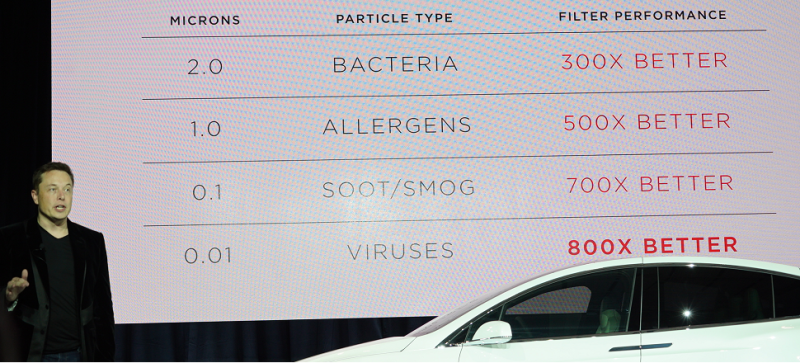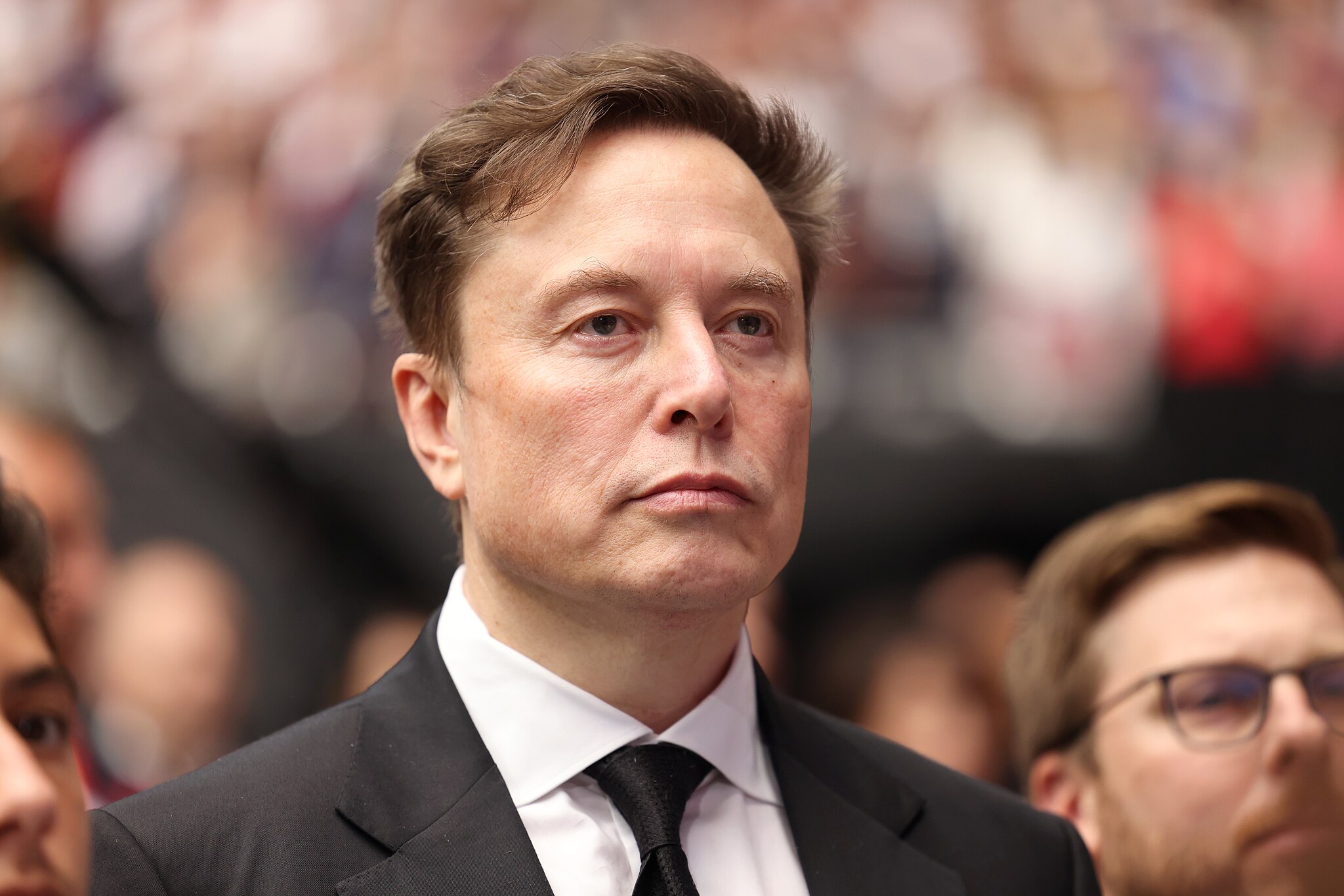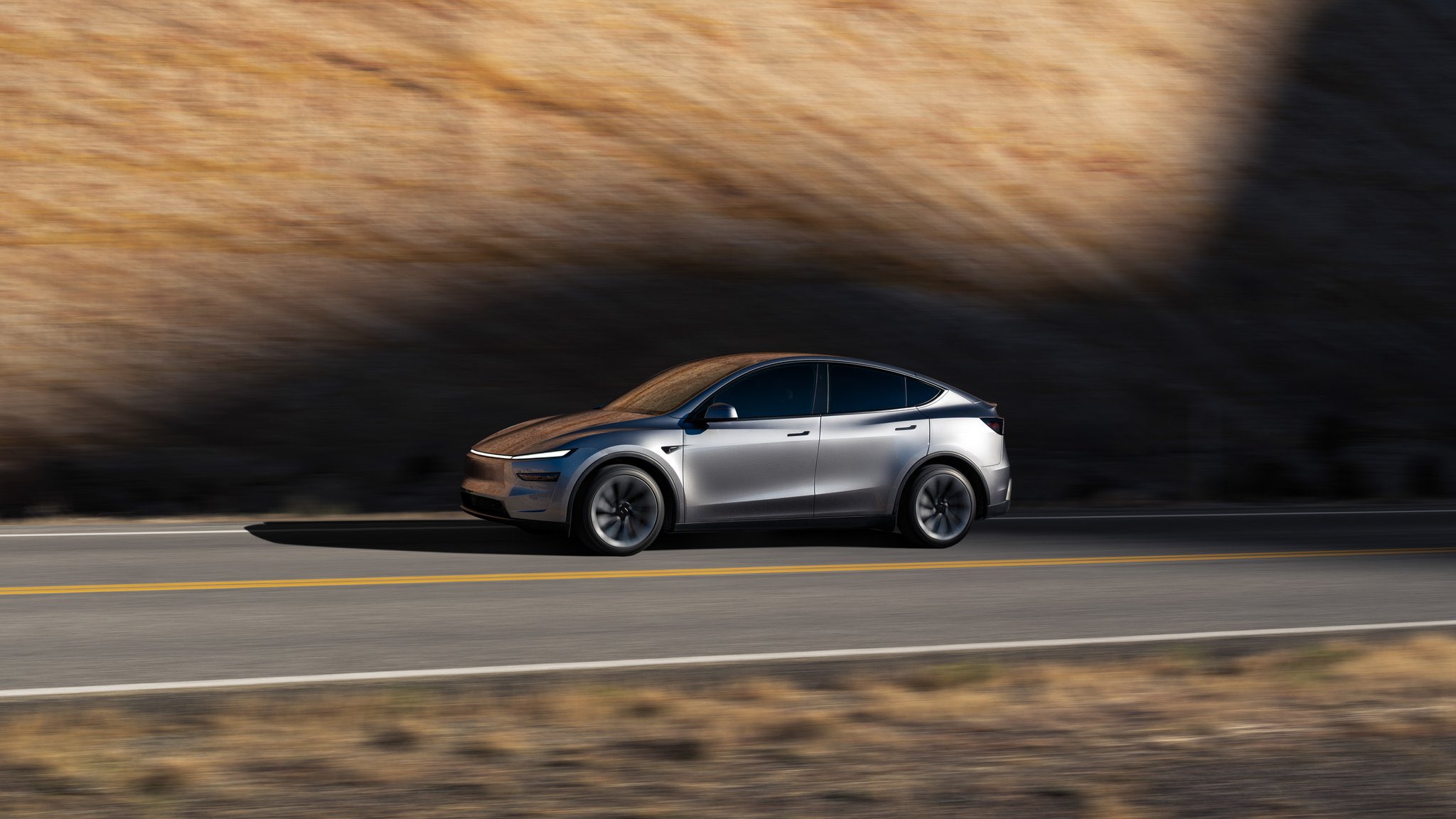News
Science Experts Question Tesla Bioweapons Defense Claims
Some scientists quibble about claims that the Tesla Bioweapons Defense Mode can protect passengers from viruses. But all agree it is an excellent system.

Make no mistake about it, the climate control system for the Model X is superior to anything available from any other manufacturer and will do an excellent job of protecting its occupants from harmful elements in the atmosphere. Tesla describes the system this way, “The biodefense button is designed to allow clean medical-grade air into the cabin and keep contaminated air out. When deployed, it pushes the system into full fresh mode, pulling all HVAC air through the HEPA filter. The fan goes to max speed 11, pulling in enough air to slightly pressurize the cabin, keeping other air from entering Model X.”
But a few people with actual bioweapons experience quibble with the Tesla Bioweapons Defense Mode claims. The issue is not whether the system works, but whether its claims regarding viruses are accurate.
Colonel Randall Larsen, retired from the U.S. Air Force and now the director of the Institute for Homeland Security, tells Gizmodo that he is actually a Tesla fan. “I’m actually building a new house, and I had them put an electrical charger in the garage, just in case I buy a Tesla,” he says. But when told about the Tesla Model X “bioweapon defense mode” he laughed out loud and asked, “So, is Musk actually advertising this?”
To be considered a real HEPA filter, an air filter has to remove 99.97% of 0.3 micrometer particles from the air. That’s fine enough to catch bacteria like anthrax. It will also stop the plague and most other bacteria, as well as most pollen, dust, and fungal spores. “Now, if you’re worried about bacterial agents like anthrax or plague, a good filtering system would probably protect you,” says Larsen.
But viruses are much smaller than bacteria, which means they’re harder to filter out of the air. “Well, 0.3 micrometer won’t hold back viruses. It will hold back most bacteria, but it won’t hold back viruses. So, if you believe that all bio-terrorist agents are bacteria, then you’ll get an increment of protection,” said Michael J. Buchmeier, deputy director of the Pacific Southwest Regional Center for Biodefense and Emerging Diseases at the University of California, Irvine.
The influenza A virus is only 120 nanometers wide, so it can pass through even a 0.2 micrometer HEPA filter without a problem. “It’s a statistical game that we play,” said Buchmeier. “Any filter like that is going to be efficient to a degree but it’s not necessarily 100% efficient.”
Larsen and Buchmeier also point out that, by the time the passengers realize there has been a bioweapons attack, it will probably be too late to take protective action. “The key problem with the bio is knowing when it’s been released,” Buchmeier says. “You know, it’s not like there’s a big bang or something. It’s a pretty extravagant long shot anyway, you know, the idea that you’re going to be forewarned enough to implement this filter in time to prevent any exposure.”
None of which should take away from how good the Model X climate control system is at protecting its passengers. It can filter out allergens like ragweed and cedar pollen, fungal spores like the ones that cause Valley Fever, and irritants like smoke and dust. It could also filter out unpleasant roadside odor. “There are a lot of reasons why you would put a filter like that in, and only one of them is bioterrorism,” says Buchmeier.

Elon Musk
Elon Musk’s net worth is nearing $800 billion, and it’s no small part due to xAI
A newly confirmed $20 billion xAI funding round valued the business at $250 billion, adding an estimated $62 billion to Musk’s fortune.

Elon Musk moved within reach of an unprecedented $800 billion net worth after private investors sharply increased the valuation of xAI Holdings, his artificial intelligence and social media company.
A newly confirmed $20 billion funding round valued the business at $250 billion, adding an estimated $62 billion to Musk’s fortune and widening his lead as the world’s wealthiest individual.
xAI’s valuation jump
Forbes confirmed that xAI Holdings was valued at $250 billion following its $20 billion funding round. That’s more than double the $113 billion valuation Musk cited when he merged his AI startup xAI with social media platform X last year. Musk owned roughly 49% of the combined company, which Forbes estimated was worth about $122 billion after the deal closed.
xAI’s recent valuation increase pushed Musk’s total net worth to approximately $780 billion, as per Forbes’ Real-Time Billionaires List. The jump represented one of the single largest wealth gains ever recorded in a private funding round.
Interestingly enough, xAI’s funding round also boosted the AI startup’s other billionaire investors. Saudi investor Prince Alwaleed Bin Talal Alsaud held an estimated 1.6% stake in xAI worth about $4 billion, so the recent funding round boosted his net worth to $19.4 billion. Twitter co-founder Jack Dorsey and Oracle co-founder Larry Ellison each owned roughly 0.8% stakes that are now valued at about $2.1 billion, increasing their net worths to $6 billion and $241 billion, respectively.
The backbone of Musk’s net worth
Despite xAI’s rapid rise, Musk’s net worth is still primarily anchored by SpaceX and Tesla. SpaceX represents Musk’s single most valuable asset, with his 42% stake in the private space company estimated at roughly $336 billion.
Tesla ranks second among Musk’s holdings, as he owns about 12% of the EV maker’s common stock, which is worth approximately $307 billion.
Over the past year, Musk crossed a series of historic milestones, becoming the first person ever worth $500 billion, $600 billion, and $700 billion. He also widened his lead over the world’s second-richest individual, Larry Page, by more than $500 billion.
News
Tesla Cybercab sighting confirms one highly requested feature
The feature will likely allow the Cybercab to continue operating even in conditions when its cameras could be covered with dust, mud, or road grime.

A recent sighting of Tesla’s Cybercab prototype in Chicago appears to confirm a long-requested feature for the autonomous two-seater.
The feature will likely allow the Cybercab to continue operating even in conditions when its cameras could be covered with dust, mud, or road grime.
The Cybercab’s camera washer
The Cybercab prototype in question was sighted in Chicago, and its image was shared widely on social media. While the autonomous two-seater itself was visibly dirty, its rear camera area stood out as noticeably cleaner than the rest of the car. Traces of water were also visible on the trunk. This suggested that the Cybercab is equipped with a rear camera washer.
As noted by Model Y owner and industry watcher Sawyer Merritt, a rear camera washer is a feature many Tesla owners have requested for years, particularly in snowy or wet regions where camera obstruction can affect visibility and the performance of systems like Full Self-Driving (FSD).
While only the rear camera washer was clearly visible, the sighting raises the possibility that Tesla may equip the Cybercab’s other external cameras with similar cleaning systems. Given the vehicle’s fully autonomous design, redundant visibility safeguards would be a logical inclusion.
The Cybercab in Tesla’s autonomous world
The Cybercab is Tesla’s first purpose-built autonomous ride-hailing vehicle, and it is expected to enter production later this year. The vehicle was unveiled in October 2024 at the “We, Robot” event in Los Angeles, and it is expected to be a major growth driver for Tesla as it continues its transition toward an AI- and robotics-focused company. The Cybercab will not include a steering wheel or pedals and is intended to carry one or two passengers per trip, a decision Tesla says reflects real-world ride-hailing usage data.
The Cybercab is also expected to feature in-vehicle entertainment through its center touchscreen, wireless charging, and other rider-focused amenities. Musk has also hinted that the vehicle includes far more innovation than is immediately apparent, stating on X that “there is so much to this car that is not obvious on the surface.”
News
Tesla seen as early winner as Canada reopens door to China-made EVs
Tesla had already prepared for Chinese exports to Canada in 2023 by equipping its Shanghai Gigafactory to produce a Canada-specific version of the Model Y.

Tesla seems poised to be an early beneficiary of Canada’s decision to reopen imports of Chinese-made electric vehicles, following the removal of a 100% tariff that halted shipments last year.
Thanks to Giga Shanghai’s capability to produce Canadian-spec vehicles, it might only be a matter of time before Tesla is able to export vehicles to Canada from China once more.
Under the new U.S.–Canada trade agreement, Canada will allow up to 49,000 vehicles per year to be imported from China at a 6.1% tariff, with the quota potentially rising to 70,000 units within five years, according to Prime Minister Mark Carney.
Half of the initial quota is reserved for vehicles priced under CAD 35,000, a threshold above current Tesla models, though the electric vehicle maker could still benefit from the rule change, as noted in a Reuters report.
Tesla had already prepared for Chinese exports to Canada in 2023 by equipping its Shanghai Gigafactory to produce a Canada-specific version of the Model Y. That year, Tesla began shipping vehicles from Shanghai to Canada, contributing to a sharp 460% year-over-year increase in China-built vehicle imports through Vancouver.
When Ottawa imposed a 100% tariff in 2024, however, Tesla halted those shipments and shifted Canadian supply to its U.S. and Berlin factories. With tariffs now reduced, Tesla could quickly resume China-to-Canada exports.
Beyond manufacturing flexibility, Tesla could also benefit from its established retail presence in Canada. The automaker operates 39 stores across Canada, while Chinese brands like BYD and Nio have yet to enter the Canadian market directly. Tesla’s relatively small lineup, which is comprised of four core models plus the Cybertruck, allows it to move faster on marketing and logistics than competitors with broader portfolios.









